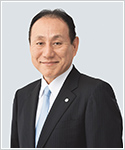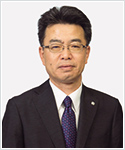
Corporate Governance System
Organizationally, Daiwa House Industry (the Company) has selected the company with Audit & Supervisory Board structure. Additionally, to clarify the management decision-making and monitoring functions and the execution function of our business, the Company employs a system of Executive Officers. The Board of Directors and its constituent Directors are in charge of decision-making and the monitoring functions, while the business execution function is handled by the Executive Officers.
Directors and Board of Directors
- Through an optimal corporate governance system, the Board of Directors
aims to realize the Company's Corporate Philosophy, carry out the monitoring
functions and perform the best possible decision-making based on fair judgment.
The Board of Directors makes decisions on important items such as those
prescribed by law, the articles of incorporation, Board of Directors Regulations,
and supervises the execution of duties by Directors.
To augment maneuverability and flexibility in the execution of operations and maximize management dynamism, the Board of Directors delegates Directors to handle decision-making on the execution of operations other than the items described in the paragraph above. - Recognizing that Medium-Term Management Plans constitute a commitment to shareholders, the Board of Directors explains to shareholders the foundations for and backgrounds of such plans, the operating environment and other items, and does its best to achieve the objectives of these plans.
- Each year, the Board of Directors analyzes and evaluates its effectiveness as a whole, taking into consideration the relevant matters, including the self-evaluations of each Director. A summary of the results is disclosed.
- Selection criteria of Director candidates and Directors' authority, responsibilities and others are prescribed separately in the Directors Regulations formulated by the Board of Directors.
- The Board of Directors is composed of Directors having specialist knowledge and experience from diverse backgrounds. To ensure the effective and efficient operations of the functions, the board has fewer than 20 members. The Board of Directors appoints one-third or more outside Directors who are independent and neutral on the board.
- The Company has in place a "Nomination Advisory Committee" and "Remuneration Advisory Committee" that act as advisory bodies to the Board of Directors, enhancing independence and objectivity in nominating Directors and functions related to remuneration. In addition, the Company has established a "Corporate Governance Committee", which deliberates on vision, strategies and other items pertaining to overall management, including corporate governance (Board Committees).
Audit & Supervisory Board and Audit & Supervisory Board Members
- The Audit & Supervisory Board audits the execution of duties of Directors and Executive Officers, determines the content of proposals for submission to the General Meeting of Shareholders on the appointment or dismissal of financial auditors or against the reappointment of financial auditors, and conducts other items prescribed by financial auditing and other laws. The Audit & Supervisory Board receives in a timely and appropriate manner reports from Directors, employees and financial auditors on items necessary for auditing the execution of duties by Directors and Executive Officers. Additionally, the Audit & Supervisory Board shares necessary information with the financial auditors, Internal Audit Office and outside Directors in an effort to improve auditing quality and perform audits efficiently.
- Having received a mandate from shareholders as independent entities to audit execution of duties of Directors and Executive Officers, Audit & Supervisory Board Members fulfill their duty to ensure healthy and sustained corporate growth and establish a high-quality corporate governance system worthy of society's trust.
- In light of the characteristics of their full-time position, full-time Audit & Supervisory Board Members work proactively to put in place audit environments and collect information. In addition, they routinely monitor and verify the status of internal control system construction and operation.
- Outside Audit & Supervisory Board Members express their opinions frankly, being that they are appointed as part of a legal requirement for augmenting the independence and neutrality of the audit structure and taking into consideration the reason for their appointment, and recognizing that they are expected to express their audit opinions neutrally and objectively.
CEO/CFO
The Board of Directors of the Company appoints, from among the directors,
a chief executive officer (CEO), who holds topmost authority with regard
to decision-making functions and monitoring functions;
a chief financial officer (CFO) who supervises and instructs management
from the corporate finance perspective.
Outside Directors
The Company appoints one-third or more outside Directors who are independent and neutral on the board. In addition to outside Directors who meet the requirements for outside Directors as prescribed in the Companies Act, in principle outside Directors are appointed who also satisfy the Independence Standards for Outside Executives formulated by the Nomination Advisory Committee. Outside Directors take the initiative to increase the level of fairness of judgments and activities by the Board of Directors and each committee and realize the best possible level of corporate governance and fill their responsibilities.
Board Committees
The Company promotes the management function with the Board of Directors comprised of Directors who are also Executive Officers, while setting itself as the organizational structure which exercises the monitoring function centering on the independent outside Directors, Audit & Supervisory Board Members and the Audit & Supervisory Board. In addition, the establishment of voluntary committees enhances the transparency of the Board of Directors. This arrangement results in a hybrid structure that balances the operational execution function and the advisory function and the Company increases its' autonomous functionality.
Nomination Advisory Committee
The Nomination Advisory Committee receives explanations from Directors
or Executive Officers, in charge of the human resources, on General Meeting
of Shareholders proposals regarding the appointment of Directors, as well
as the evaluation of individual Directors, and discusses their appropriateness
and states its opinion, ensuring the objectivity of Director nominations.
Also, the Nomination Advisory Committee formulates the Independence Standards for Outside Executives on the appointment of independent and neutral outside Directors and elects,
as a principle, outside directors who satisfy the criteria.
(Chair: Independent Outside Director)
Remuneration Advisory Committee
The Remuneration Advisory Committee receives advice on the policies for
determining the remuneration of Directors, as well as the content of individual
remuneration, and states its opinion regarding the remuneration of Directors
and Executive Officers, in order to ensure objectivity. Also, the Remuneration
Advisory Committee proactively seeks out external research and other data,
examines the appropriateness of the process for determining remuneration.
(Chair: Independent Outside Director)
Corporate Governance Committee
The Corporate Governance Committee is composed of outside Directors, outside
Audit & Supervisory Board Members and full-time Audit & Supervisory
Board Members, the CEO, COO and CFO and Representative Directors. This
committee conducts exchanges of views on vision, strategies and other items
related to corporate governance and overall Company management from diverse
perspectives and based on a long-term viewpoint. By incorporating into
corporate management the full extent of the knowledge and wisdom of outside
Directors and outside Audit & Supervisory Board Members, the Corporate
Governance Committee aims to create a "better company," convening
with the principal purpose of contributing to corporate value creation
over the medium to long term.
Furthermore, this committee exchanges opinions about the Company's initiatives
related to SDGs and ESG, in addition to receiving information regarding
important matters from following committees.
(Chair: Independent Outside Director)
The Company's system to promote initiatives related to Environmental and Social initiatives
The Company aims to succeed in contributing to creating a sustainable society. To realize that, The Company has established following committees to specify management policies, strategies, and high-priority issues from a medium- to long-term perspective, and is operating a system to promote initiatives related to Environmental and Social initiatives.
Companywide Environment Committee
The Companywide Environment Committee is established to realize the Company's social responsibility and roles related to nature capital, in line with the Environmental Vision. This committee deliberates and decides fundamental items related to the Company's environmental activities and acts as the body providing companywide instruction and management on environmental activities.
(Chair: Officer in charge of Environment)
In order to improve the effectiveness of the visions and strategies designed to improve corporate value over the medium to long term, this committee will provide information to the Corporate Governance Committee regarding important matters concerning the Company's initiatives related to SDGs and ESG, particularly those related to the environment.
Sustainability Committee
The Sustainability Committee is established to stay up to date with and make improvements in response to high-priority issues among ESG issues such as the Company's relationship with employees and business partners, and particularly those related to society. This committee deliberates and determines how to make improvements in relation to high-priority issues, particularly those related to society that the Company should address, and acts as the body providing companywide instruction and management on social activities.
(Chair: the head of Management Administration)
In order to improve the effectiveness of the visions and strategies designed to improve corporate value over the medium to long term, the Sustainability Committee will provide information to the Corporate Governance Committee regarding important matters concerning the Company's initiatives related to SDGs and ESG, particularly those related to society.
Committee Structure Related to Execution of Operations
The Company establishes the following committees related to the execution of operations in order to contribute to the execution of operations by Executive Officers and to execute accurately and swiftly decisions determined by the Board of Directors.
Joint Membership Council.
The Company establishes a joint panel of Directors and Executive Officers
in order to fulfill their responsibilities for the operation and encourage
mutual communications, as well as to appropriately execute decisions determined
by the Board of Directors.
(Chair: CEO)
Internal Control Committee
The Company establishes an Internal Control Committee to implement internal controls in accordance with the Basic Policy on Construction of the Internal Control System formulated, and requests reports on the system's operational status and provides supervision.
(Chair: Head of Management Administration)
Risk Management Committee
The Board of Directors establishes a Risk Management Committee as the organization to The Board of Directors establishes a Risk Management Committee as the organization to prevent risks from being actualized, discover risks and reduce the amount of damage as they become apparent.
(Chair: Head of business division)
Business Investments Committee
The Company’s Business Investments Committee is responsible for
deliberating on and assessing the feasibility and risks of important
potential investments in the real estate development business and
other businesses to ensure that decision-making about the
deployment of capital is reasonable and effective.
(Chair: CEO)




